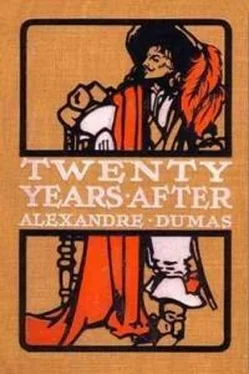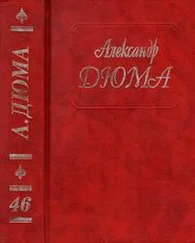Bazin obeyed, fastened to the end of a cord the three articles designated and let them down to Planchet, who then went satisfied to his shed.
"Now to supper," said Aramis.
The two friends sat down and Aramis began to cut up fowls, partridges and hams with admirable skill.
"The deuce!" cried D’Artagnan; "do you live in this way always?"
"Yes, pretty well. The coadjutor has given me dispensations from fasting on the jours maigres, on account of my health; then I have engaged as my cook the cook who lived with Lafollone—you know the man I mean?—the friend of the cardinal, and the famous epicure whose grace after dinner used to be, ’Good Lord, do me the favor to cause me to digest what I have eaten.’"
"Nevertheless he died of indigestion, in spite of his grace," said D’Artagnan.
"What can you expect?" replied Aramis, in a tone of resignation. "Every man that’s born must fulfil his destiny."
"If it be not an indelicate question," resumed D’Artagnan, "have you grown rich?"
"Oh, Heaven! no. I make about twelve thousand francs a year, without counting a little benefice of a thousand crowns the prince gave me."
"And how do you make your twelve thousand francs? By your poems?"
"No, I have given up poetry, except now and then to write a drinking song, some gay sonnet or some innocent epigram; I compose sermons, my friend."
"What! sermons? Do you preach them?"
"No; I sell them to those of my cloth who wish to become great orators."
"Ah, indeed! and you have not been tempted by the hopes of reputation yourself?"
"I should, my dear D’Artagnan, have been so, but nature said ’No.’ When I am in the pulpit, if by chance a pretty woman looks at me, I look at her again: if she smiles, I smile too. Then I speak at random; instead of preaching about the torments of hell I talk of the joys of Paradise. An event took place in the Church of St. Louis au Marais. A gentleman laughed in my face. I stopped short to tell him that he was a fool; the congregation went out to get stones to stone me with, but whilst they were away I found means to conciliate the priests who were present, so that my foe was pelted instead of me. ’Tis true that he came the next morning to my house, thinking that he had to do with an abbe—like all other abbes."
"And what was the end of the affair?"
"We met in the Place Royale—Egad! you know about it."
"Was I not your second?" cried D’Artagnan.
"You were; you know how I settled the matter."
"Did he die?"
"I don’t know. But, at all events, I gave him absolution in articulo mortis. ’Tis enough to kill the body, without killing the soul."
Bazin made a despairing sign which meant that while perhaps he approved the moral he altogether disapproved the tone in which it was uttered.
"Bazin, my friend," said Aramis, "you don’t seem to be aware that I can see you in that mirror, and you forget that once for all I have forbidden all signs of approbation or disapprobation. You will do me the favor to bring us some Spanish wine and then to withdraw. Besides, my friend D’Artagnan has something to say to me privately, have you not, D’Artagnan?"
D’Artagnan nodded his head and Bazin retired, after placing on the table the Spanish wine.
The two friends, left alone, remained silent, face to face. Aramis seemed to await a comfortable digestion; D’Artagnan, to be preparing his exordium. Each of them, when the other was not looking, hazarded a sly glance. It was Aramis who broke the silence.
"What are you thinking of, D’Artagnan?" he began.
"I was thinking, my dear old friend, that when you were a musketeer you turned your thoughts incessantly to the church, and now that you are an abbe you are perpetually longing to be once more a musketeer."
"’Tis true; man, as you know," said Aramis, "is a strange animal, made up of contradictions. Since I became an abbe I dream of nothing but battles."
"That is apparent in your surroundings; you have rapiers here of every form and to suit the most exacting taste. Do you still fence well?"
"I—I fence as well as you did in the old time—better still, perhaps; I do nothing else all day."
"And with whom?"
"With an excellent master–at–arms that we have here."
"What! here?"
"Yes, here, in this convent, my dear fellow. There is everything in a Jesuit convent."
"Then you would have killed Monsieur de Marsillac if he had come alone to attack you, instead of at the head of twenty men?"
"Undoubtedly," said Aramis, "and even at the head of his twenty men, if I could have drawn without being recognized."
"God pardon me!" said D’Artagnan to himself, "I believe he has become more Gascon than I am!" Then aloud: "Well, my dear Aramis, do you ask me why I came to seek you?"
"No, I have not asked you that," said Aramis, with his subtle manner; "but I have expected you to tell me."
"Well, I sought you for the single purpose of offering you a chance to kill Monsieur de Marsillac whenever you please, prince though he is."
"Hold on! wait!" said Aramis; "that is an idea!"
"Of which I invite you to take advantage, my friend. Let us see; with your thousand crowns from the abbey and the twelve thousand francs you make by selling sermons, are you rich? Answer frankly."
"I? I am as poor as Job, and were you to search my pockets and my boxes I don’t believe you would find a hundred pistoles."
"Peste! a hundred pistoles!" said D’Artagnan to himself; "he calls that being as poor as Job! If I had them I should think myself as rich as Croesus." Then aloud: "Are you ambitious?"
"As Enceladus."
"Well, my friend, I bring you the means of becoming rich, powerful, and free to do whatever you wish."
The shadow of a cloud passed over Aramis’s face as quickly as that which in August passes over the field of grain; but quick as it was, it did not escape D’Artagnan’s observation.
"Speak on," said Aramis.
"One question first. Do you take any interest in politics?"
A gleam of light shone in Aramis’s eyes, as brief as the shadow that had passed over his face, but not so brief but that it was seen by D’Artagnan.
"No," Aramis replied.
"Then proposals from any quarter will be agreeable to you, since for the moment you have no master but God?"
"It is possible."
"Have you, my dear Aramis, thought sometimes of those happy, happy, happy days of youth we passed laughing, drinking, and fighting each other for play?"
"Certainly, and more than once regretted them; it was indeed a glorious time."
"Well, those splendidly wild days may chance to come again; I am commissioned to find out my companions and I began by you, who were the very soul of our society."
Aramis bowed, rather with respect than pleasure at the compliment.
"To meddle in politics," he exclaimed, in a languid voice, leaning back in his easy–chair. "Ah! dear D’Artagnan! see how regularly I live and how easy I am here. We have experienced the ingratitude of ’the great,’ as you well know."
"’Tis true," replied D’Artagnan. "Yet the great sometimes repent of their ingratitude."
"In that case it would be quite another thing. Come! let’s be merciful to every sinner! Besides, you are right in another respect, which is in thinking that if we were to meddle in politics there could not be a better time than the present."
"How can you know that? You who never interest yourself in politics?"
"Ah! without caring about them myself, I live among those who are much occupied in them. Poet as I am, I am intimate with Sarazin, who is devoted to the Prince de Conti, and with Monsieur de Bois–Robert, who, since the death of Cardinal Richelieu, is of all parties or any party; so that political discussions have not altogether been uninteresting to me."
Читать дальше






![О Генри - Через двадцать лет [After Twenty Years]](/books/415401/o-genri-cherez-dvadcat-let-after-twenty-years-thumb.webp)





